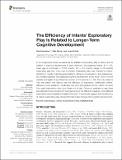| dc.contributor.author | Muentener, Paul Jason | |
| dc.contributor.author | Herrig, Elise | |
| dc.contributor.author | Schulz, Laura E | |
| dc.date.accessioned | 2018-09-04T13:58:30Z | |
| dc.date.available | 2018-09-04T13:58:30Z | |
| dc.date.issued | 2018-05 | |
| dc.date.submitted | 2017-06 | |
| dc.identifier.issn | 1664-1078 | |
| dc.identifier.uri | http://hdl.handle.net/1721.1/117605 | |
| dc.description.abstract | In this longitudinal study we examined the stability of exploratory play in infancy and its relation to cognitive development in early childhood. We assessed infants' (N = 130, mean age at enrollment = 12.02 months, SD = 3.5 months; range: 5-19 months) exploratory play four times over 9 months. Exploratory play was indexed by infants' attention to novelty, inductive generalizations, efficiency of exploration, face preferences, and imitative learning. We assessed cognitive development at the fourth visit for the full sample, and again at age three for a subset of the sample (n = 38). The only measure that was stable over infancy was the efficiency of exploration. Additionally, infants' efficiency score predicted vocabulary size and distinguished at-risk infants recruited from early intervention sites from those not at risk. Follow-up analyses at age three provided additional evidence for the importance of the efficiency measure: more efficient exploration was correlated with higher IQ scores. These results suggest that the efficiency of infants' exploratory play can be informative about longer-term cognitive development. | en_US |
| dc.description.sponsorship | Simons Foundation | en_US |
| dc.description.sponsorship | John Merck Scholar Award | en_US |
| dc.description.sponsorship | National Science Foundation (U.S.). Faculty Early Career Development Program (award) | en_US |
| dc.description.sponsorship | National Science Foundation (U.S.). Science and Technology Center (grant from the Center for Brains Minds, and Machines (CBMM)) | en_US |
| dc.description.sponsorship | National Science Foundation (U.S.). Science and Technology Center (award CCF-1231216 ) | en_US |
| dc.publisher | Frontiers Research Foundation | en_US |
| dc.relation.isversionof | http://dx.doi.org/10.3389/fpsyg.2018.00635 | en_US |
| dc.rights | Creative Commons Attribution 4.0 International License | en_US |
| dc.rights.uri | http://creativecommons.org/licenses/by/4.0/ | en_US |
| dc.source | Frontiers | en_US |
| dc.title | The Efficiency of Infants' Exploratory Play Is Related to Longer-Term Cognitive Development | en_US |
| dc.type | Article | en_US |
| dc.identifier.citation | Muentener, Paul, Elise Herrig, and Laura Schulz. “The Efficiency of Infants’ Exploratory Play Is Related to Longer-Term Cognitive Development.” Frontiers in Psychology 9 (May 31, 2018). | en_US |
| dc.contributor.department | Massachusetts Institute of Technology. Department of Brain and Cognitive Sciences | en_US |
| dc.contributor.mitauthor | Muentener, Paul Jason | |
| dc.contributor.mitauthor | Herrig, Elise | |
| dc.contributor.mitauthor | Schulz, Laura E | |
| dc.relation.journal | Frontiers in Psychology | en_US |
| dc.eprint.version | Final published version | en_US |
| dc.type.uri | http://purl.org/eprint/type/JournalArticle | en_US |
| eprint.status | http://purl.org/eprint/status/PeerReviewed | en_US |
| dc.date.updated | 2018-08-30T13:47:18Z | |
| dspace.orderedauthors | Muentener, Paul; Herrig, Elise; Schulz, Laura | en_US |
| dspace.embargo.terms | N | en_US |
| dc.identifier.orcid | https://orcid.org/0000-0002-2981-8039 | |
| mit.license | PUBLISHER_CC | en_US |
